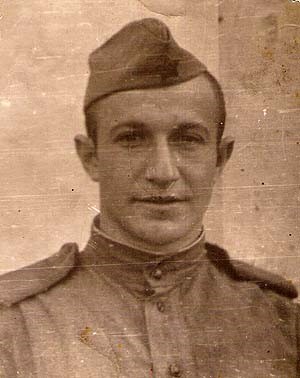Grigorii Rabinovich was born in 1922 in the village of Rokytne, south of Kiev, in Ukraine. His father was a tailor. Grigorii graduated from a ten-year school in 1941 and expected to be drafted. In June 1941, the Soviet-German war began. Rabinovich recalled that many Ukrainian peasants did not conceal their joy at the German attack on the Soviet Union and did not want to fight. He received a call up for military service in July 1941 and, together with 80 other draftees, was taken on foot eastward. On the way most of the Ukrainian conscripts deserted so that when their column arrived in Poltava, in eastern Ukraine, it consisted only of Jews and Ukrainian sons of Party and Soviet officials. Eventually, the draftees arrived in Bashkiria, in the Urals, where they underwent military training.
Grigorii's frontline experience began in July 1942 in the North Caucasus. He was caught up in steady retreat of the Red Army from Rostov-on-Don to Stalingrad on the Volga River, almost without any clashes with the enemy. Grigorii took part in the Stalingrad operation between the fall of 1942 and the winter of 1943. Then until 1945 he took part in the Red Army offensive in the Upper Don area, then in the Kharkov operation, which was a disaster for the Red Army. Subsequently, he fought in Ukraine, Romania, Hungary, and Austria. He recalled the Budapest operation of 1944-1945 as the most terrible one he experienced, even more terrible than Stalingrad and Kharkov.
In Ukraine Rabinovich's division was reinforced by Ukrainians who were not drafted in 1941 or had escaped earlier recruitment. Rabinovich noted that those people, who had lived under the German occupation between 1941 and 1943, introduced considerable antisemitism into the ranks of the Red Army. He also recalled discrimination against Jews in the granting of military awards.
Grigorii Rabinovich met VE-Day in the mountains of Austria. Since neither the German nor the Soviet forces there knew that the war had ended, fighting in this area stopped only on May 11. On that day his unit met U.S. military units, with which a joint victory celebration was organized. After that, Grigorii's unit was transferred to western Ukraine to fight the Ukrainian Insurgent Army – an anti-Soviet nationalist military formation that refused to lay down its weapons in 1945. Rabinovich was released from military service only in November 1946.
After the war Rabinovich worked as an economist.
It was difficult to bear the surname Rabinovich at the front!
From the interview of Grigorii Rabinovich gave in 2010.
On antisemitism introduced into the army ranks by the draftees of 1944:
How it was for you, a man with such a typical Jewish surname Rabinovich, to fight with such reinforcements?"
- Once they shot me in the back and tried to throw a grenade at me...
Prior to our offensive in Romania, we were stationed in Moldova for two weeks. We were billeted in the house of a wealthy Moldovan who fed us heartily. Once, two of my Ukrainian soldiers were sitting at the table drinking, and one of them said to the other: 'I shot at this Yid, but I missed.' The second one saw me standing nearby and hearing everything. He immediately hissed into the ear of the first soldier "Shut up!". …
Near Focșani, I was assigned to be on the guard with two soldiers on horseback. We were the first to enter Romanian villages to check whether there was an enemy there […]. One of the Ukrainians began to rile up his fellow countryman, saying "Don't listen, don't obey this Yid, this 'Cossack of Jerusalem'... I had to kill him when I got the chance ...
But not all Ukrainians drafted from the liberated territories were infected with a bacillus of antisemitism.
Other cases of antisemitism at the front:
"Once I was assigned to accompany deputy army commander General Sherstiuk on the front lines. He was walking along the trenches and, at first, being in a good mood, he cracked a joke, saying: 'My boy, there are many generals, but only one deputy army commander,' and so on. Then he began to ask me who I was, where was I from, asked what my surname was. Then asked my surname again and, all of a sudden, shouted: 'Who sent you to me and why?'
"At night we settled down to rest, and suddenly a drunken captain of cavalry, in dirty uniform, entered the house where my platoon was sleeping. The soldiers awoke me and said: 'we have a guest, an officer'. I got up and offered the captain a drink. He replied: 'I don't drink with Yids!'".
From iremember.ru







